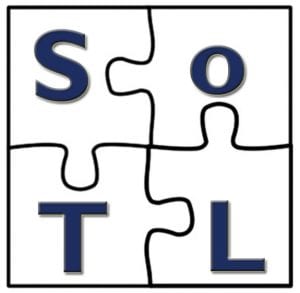 In the summer of 2015, the Teaching Center initiated Summer Writing Groups as a way to support faculty in their Scholarship of Teaching and Learning (SoTL). It was clear that many faculty members were doing SoTL, but some needed the structure and accountability of a group to help their work progress to a presentation or publication. Since then, approximately 8 different writing groups have formed and worked together following the ideas of the book, Writing Your Journal Article in 12 Weeks by Wendy Belcher, a recommendation of our colleague Cheryl Slay Carr, Associate Professor of Music Business.
In the summer of 2015, the Teaching Center initiated Summer Writing Groups as a way to support faculty in their Scholarship of Teaching and Learning (SoTL). It was clear that many faculty members were doing SoTL, but some needed the structure and accountability of a group to help their work progress to a presentation or publication. Since then, approximately 8 different writing groups have formed and worked together following the ideas of the book, Writing Your Journal Article in 12 Weeks by Wendy Belcher, a recommendation of our colleague Cheryl Slay Carr, Associate Professor of Music Business.
Below is a reflection by Rachel Rigsby, Associate Professor of Chemistry, about her experience with a Teaching Center Writing Group. Be on the lookout for an invitation from the Teaching Center in April to form your own summer 2017 writing group!
Successes of a Teaching Center-Sponsored Writing Group
Rachel Rigsby Ph.D., Associate Professor of Chemistry
Most faculty would probably agree that scholarship, especially preparing scholarly manuscripts, can be challenging. In addition to teaching and service responsibilities and actually doing the scholarly work, the task can be daunting. To help with this, in 2015 the Teaching Center sponsored several inter-disciplinary writing groups organized loosely around principles found in Wendy Belcher’s book Writing Your Journal Article in 12 Weeks. One copy of the book was provided to each group. Our group consisted of the following members:
Rachel Rigsby Chemistry
Andy Miller Mathematics & Computer Science
Krista McBride Physics
Danielle Garrett Chemistry
Ann Coble Theology & Christian Ministry
Jayme Yeo English
The group was a mix of Assistant and Associate Professors and a Lecturer. We met every other week during the summer of 2015 and read the first five chapters of Belcher’s book. Group members agreed to provide a chapter summary and lead one discussion. We discussed the topics and related them to our own scholarship, attempting to work on writing tasks recommended in the book. This included creating abstracts or outlines for our intended scholarship and being open about ‘excuses’ for not writing. A listing of the chapters that guided are meetings are:
Week 1: Designing Your Plan for Writing
Week 2: Starting Your Article
Week 3: Advancing Your Argument
Week 4: Selecting a Journal
Week 5: Reviewing the Related Literature
The summer was very informative and productive, so we decided to continue meeting every other week and progress through the book and our writing at our own pace. At meetings, we gave updates and feedback on our scholarship in progress. By the end of fall 2015, every group member had successfully completed at least one scholarly work, ranging from conference presentations to peer-reviewed manuscript submissions. Members unanimously agreed that they would not have been as productive without the support and accountability of the group, which fostered a positive, encouraging environment in which faculty could effectively move forward in their scholarship.
Our group continued to meet through the spring and fall of 2016. Several of us saw the manuscripts we had labored over in 2015 published. We celebrated with chocolate at every ‘acceptance’ notification! In the Scholarship of Teaching and Learning, we published in the disciplinary journals Biochemistry and Molecular Biology Education, Physics Teacher, and Chemical Educator. Other scholarly works included an invited online encyclopedia article and a (funded) grant proposal. Multiple conference presentations were also successfully given by group members.
One of the most effective aspects of the writing group for everyone was the accountability of the regular meetings. Having multiple mini-deadlines forced us to be productive, even if it was only a little bit of progress the night before our meetings. Over the course of the semester, that time added up. The best take-away from the book for me personally was the additional accountability of adding specific writing tasks into my calendar. This varied from ‘read 1 background paper’ to ‘create a table of results’. Creating these bite-sized tasks made my manuscript feel less daunting.
I would encourage everyone to consider being part of a writing group. Belcher’s book provides many practical tips to help people get started and keep moving forward in their scholarship. You will enjoy meeting with colleagues and learning about their scholarship while you move forward with your own. And you have a group to celebrate with when you succeed!